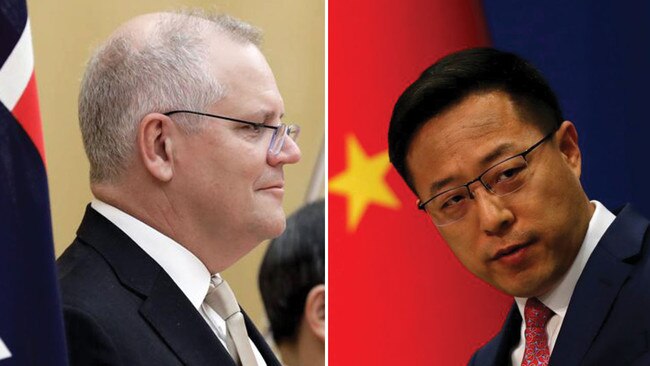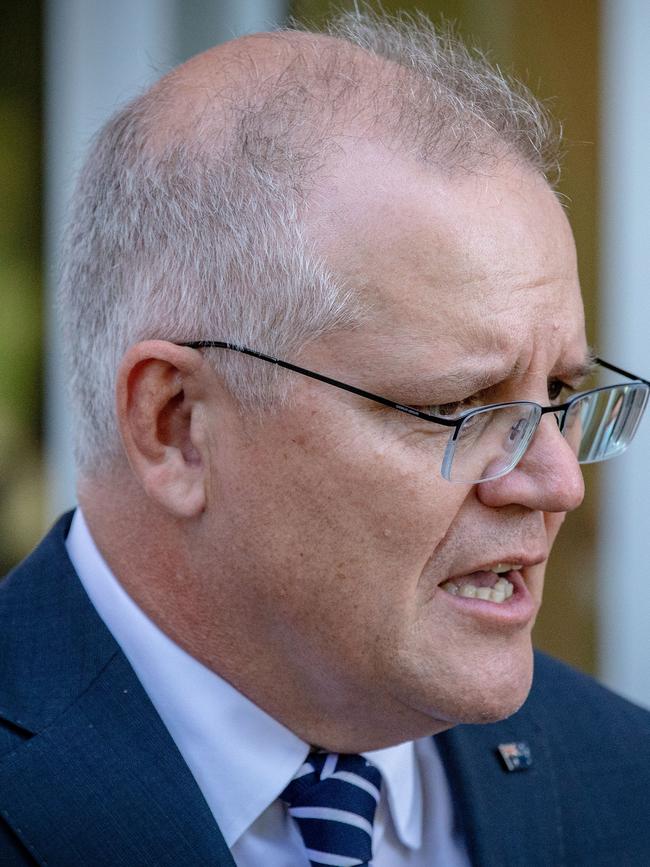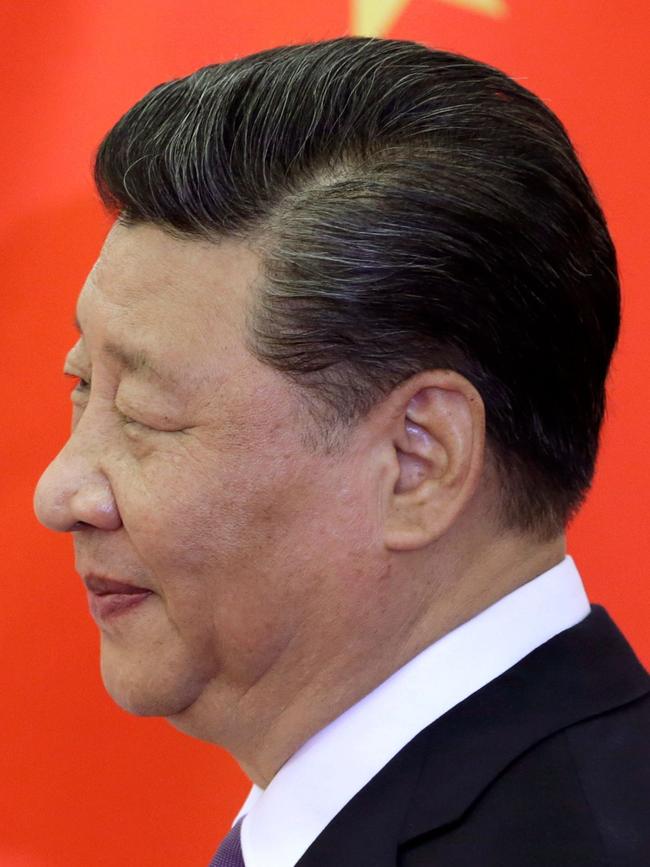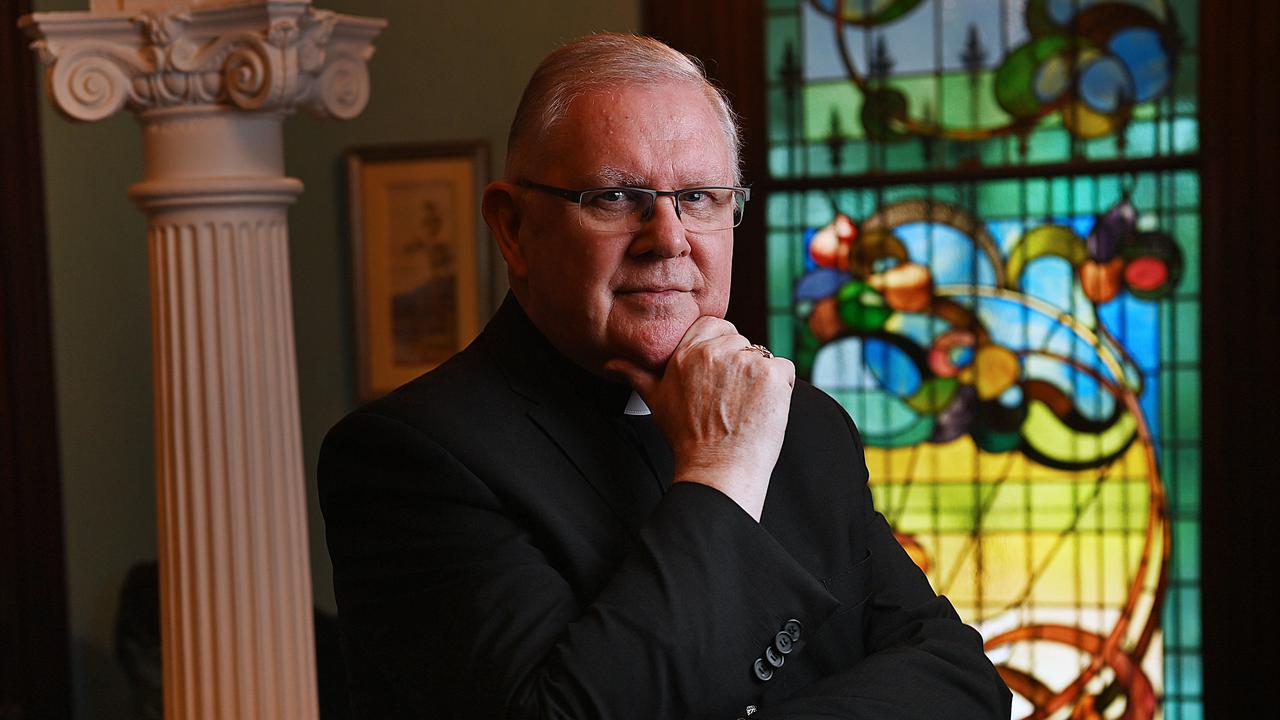PM needs a cool head to deal with Beijing


Beijing seeks to punish Australia and to teach Australia a lesson — that Beijing will dictate the terms of this relationship and that Australia is guilty of a grievous blunder in not grasping this reality, a blunder for which Australia will pay an unspecified price for an unknown period. What China gains from this project is highly dubious.
Scott Morrison faces a rare, difficult and unpredictable challenge with Beijing. He will need a cool head, long-run patience, internal cohesion within his government and as much external support as can be mustered. But the Prime Minister operates in a void of uncertainty since nobody in the Australian government really understands the actual logic in Beijing’s behaviour, if indeed there is much logic.
In his emotional rebuttal of China on Monday Morrison felt obliged to offer his most explicit olive branch so far: he called for a diplomatic “reset” where “dialogue can be restarted without conditions”. He wants to “sit down and start talking sensibly” and says this issue transcends Australia because it is something bigger — a case study for how other sovereign nations can manage Beijing.
That’s partly true. But other nations are hardly going to solve Australia’s problem. There is no sign China has any interest in a reset and, indeed, it may be embarking on a longer-run calculation of how to reduce its dependence on Australian trade. The fake social media image of an Australian soldier killing an Afghan child — posted by Foreign Affairs deputy director-general, Zhao Lijian — reveals how far relations have sunk in Beijing’s eyes.
Within China’s apparatus there is no sanction, just reward, for denigration of Australia. The hostile signals from the top permeate the system. Australian ministers are denied contact with their Chinese counterparts; Morrison cannot speak with Xi Jinping; Beijing no longer pretends its trade retaliation is just about trade; by lodging its 14 points of grievance it seeks to dictate policy and extract core democratic concessions from Australia through economic coercion.
Australia’s reaction is predictable. If China thinks its coercion will secure transactional concessions it is mistaken, but it may have other motives. When Morrison says Australia will not compromise on core values he has public opinion behind him. The Coalition and Labor are united on this front despite Labor’s criticism of the government’s China management.

Public sentiment is turning against China. Trust in China is in decline, with the mid-year Lowy poll showing 94 per cent of people said Australia should reduce its trade dependence on China.
The once lauded China-Australia Free Trade Agreement and the strategic partnership are deeply compromised. Morrison’s task, however, is to limit the damage. Don’t believe things can’t get worse. Australia’s post-2005 prosperity has been significantly built on the China relationship. National income levels, export markets across a range of industries and hundreds of thousands of jobs are ultimately at stake. Trying to contain the economic damage is a critical national interest objective and this is recognised by both sides, Coalition and Labor.
Domestic politics will be a complicating factor driven by anti-China resentment, grassroots resistance to Beijing’s intimidation, its trade sabotage and emotional reactions when the Afghanistan alleged war crimes are recruited against us. But Morrison cannot let domestic politics drive this debate or the government’s reaction and that will be challenging for a prime minister so closely attuned to the public mood and so astute at tapping into it.


One alarming lesson from the past 48 hours is the potential for the Brereton report to be mobilised against Australia by outside forces, only accentuating the extreme domestic sensitivities about how to proceed with its findings. Morrison’s attachment to the Australian Defence Force is genuine, partly reflecting its special status in the formation of the nation’s character and the Anzac story. He responded because he felt China crossed a line. It was about national honour.
China’s posting went to the bedrock of national psyche but emotion has no role in managing the China crisis. It is easy to say Morrison overreacted but a powerful response from the Prime Minister at such an insult was essential. His remark that this was not the way to conduct differences between nations was the most telling comment.
For Australia, there will be no return to the China relationship of the Howard era. China has become more successful, assertive and paranoid. Anyone who thought a few years ago that Australia might distance itself from the US alliance to better manage China was profoundly mistaken. China is proving that it is not a safe or reliable partner. This legacy will last years.
It means Morrison will reinforce his two strategic messages — that the US alliance is more important than ever and that Australia’s approach to China must flow through deeper regional engagement with Japan, India, Indonesia, the Association of Southeast Asian Nations and Pacific Islands nations.
It is true that nobody on the Australian side has any magic formula or initiative on how to break this relationship spiral. On three decisive recent issues — foreign interference laws, banning Huawei from the 5G network and campaigning for the inquiry into the COVID-19 origins — Australia hurt China on the global stage. The message from the Huawei decision was stark — we don’t trust China in our communication systems — and other Western nations should not trust China, either.
Once the “no trust” flag was flown, return fire was to be expected. Australia misjudged the collective impact of these and other decisions on Beijing. Indeed, there is little evidence we properly assessed that impact. It is imperative, however, that Australia avoid any hint of entering a retaliatory blow-by-blow encounter with Beijing. We cannot win that. China is not yet the enemy and we must ensure — to the full extent of our capacity — it does not become the enemy.
Australia needs to get proactive; standing by our principles is essential but aggravation of China at the margin is absurd. The government must inject guidance when it comes to ASIO “raids” in relation to foreign interference laws to ensure ASIO does not determine future relations with China.
Much depends on whether Xi decides to settle the situation down with President Joe Biden or escalate China’s muscle flexing. As for Australia, China had the chance to win us with charm but its resort to the big stick only points to a long dark night.







The China that Australia must manage is a profoundly dysfunctional entity riddled with contradictions — an economic powerhouse but a Communist Party autocracy, arrogant yet vulnerable, projecting strength yet betraying weakness, exploiting Western openness but addicted to internal tyranny, a leadership obsessed with gaining international legitimacy whose behaviour casts a permanent shadow over that aspiration.